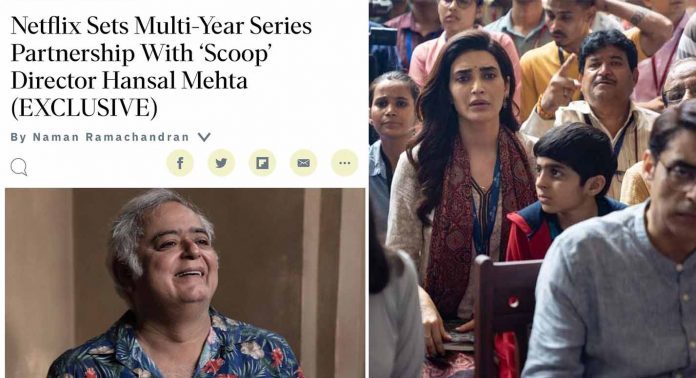Netflix’s Scoop is more than just a television program; it’s an experience, particularly for media professionals worldwide. Not only does it transport the audience back to a time when the Mumbai underworld ruled the city with an iron fist.
Based on former crime reporter Jigna Vora’s book Behind Bars in Byculla: My Days in Prison, the series depicts how crime reporter Karishma Tanna’s Jagruti Pathak (character name changed to avoid contractual obligations, maybe!) was framed by the Mumbai police for doing her job and how they linked her to notorious don Chota Rajan in the murder of another journalist.
With impeccable performances, flawless writing, and art direction to die for. The series is not only a must-see for those interested in the Indian underworld saga but also for aspiring journalists. Who has no idea how difficult it is to obtain the ultimate prize: a byline on the front page of a leading newspaper?
The scheme
Scoop focuses on the murder of a prominent crime reporter, Jaideb Sen (Prosenjit Chatterjee), for which the Mumbai Police purportedly frame another journalist, Jagruti Pathak (Karishma Tanna), at the behest of the underworld. Despite her close relationship with JCP Harshavardhan Shroff (Harman Baweja) and her absence from the city at the time of the crime. It would be accurate to state that the show is a cat-and-mouse game involving not two but three parties.
The Ideal
Since Sacred Games and Mirzapur, which wouldn’t have been successful without the excessive use of profanity. With intimate scenes and over-the-top action, Indian television has come a long way.
Director Hansal Mehta deserves praise for a job well done after Scam 1992. If you thought that he might not be able to top that series with another one, you were mistaken. As he used a larger platform to his advantage to tell a story that was both contemporary and relatable due to the increase in crime reporting.
Every actor in the show, from the leading lady Karishma Tanna to Mohammed Zeeshan Ayyub, Harman Baweja to Deven Bhojani, Tannishtha Chatterjee to Prosenjit Chatterjee, gave the best performance of their lives and appeared more like the characters they were based on than actors portraying characters assigned to them.
If Pratik Gandhi carried Hansal Mehta’s last major television show on his shoulders. She wears multiple costumes as Jagruti Pathak and excels in all of them.
Before watching the series, I wasn’t sure if Karishma Tanna would be able to carry off the role of the main character. However, she proves me and others wrong by delivering a powerful performance as the main character. One who must establish a name for herself in a world dominated by men, and she does so admirably.
In this series, he portrays a fitness-obsessed cop who is responsible for everything that has gone wrong. In Jagruti’s life, he believes he is moving in the correct direction.
Deven Bhojani, Tannishtha Chatterjee, Ayaz Khan, Inayat Sood, and others who may have portrayed minor characters. But left an impression on viewers with their performances must also be mentioned.
Imran Siddiqui, portrayed by Zeeshan Ayyub, speaks flawless Urdu, whereas Jagruti, portrayed by Karishma Tanna. Converses with a fellow Gujarati in Gujarati. Karan Vyas, the man with the mystical pen who penned the dialogues for Scam 1992, reunites with Hansal Mehta. To create a script that demonstrates to younger audiences why the pen is more powerful than anything else.
The Poor
First, the director could have utilized veteran actor Prosenjit Chatterjee more effectively and given him more sequences. Second, it would have been preferable if the episodes were no longer than 40 minutes. As it occasionally appeared as though the director was squandering time in order to surpass the 50-minute mark.
Also, if the director had known that Zeeshan Ayyub had incorrectly credited Jonathan Fraser for a quote. About journalism, he could have easily changed it in post-production. However, he chose not to, which would appear odd to journalists who know the difference between Jonathan Fraser and Jonathan Foster, who actually said those words.
And then there were the differences between the show and the source material. Despite the director’s best efforts to remain faithful to the book, he takes unnecessary creative liberties.
Similarly, the director could have played with the intensity of the lights never turned off in jail to emphasize the protagonist’s propensity for insomnia. Whereas the scenes in which the new inmate was mistreated could have been avoided because they have been overdone in the film. I also believe that the book’s opening flashback effect would have aided the screenwriter. In developing a compelling script, which might have performed even better in the hands of a magician such as Hansal Mehta.
The Decision
Overall, Scoop is a must-watch television program because it provides a welcome break from Saas Bahu dramas. Broadcast on television and the extremely aggressive (for no reason) web series intended for adult viewers. It has emotions and drama and keeps the audience on the edge of their seats throughout its run. Making it a one-of-a-kind Indian program to be released this year on Netflix.
And then into a courtroom drama that would put many Bollywood films to shame. Those who have read Hussain Zaidi’s books, such as Dongri to Dubai. Byculla to Bangkok, and My Name Is Abu Salem, will be able to relate to what transpired in Scoop. Those who haven’t may need to conduct their own research to comprehend the cutthroat world of the underworld, media, and police in Mumbai.
